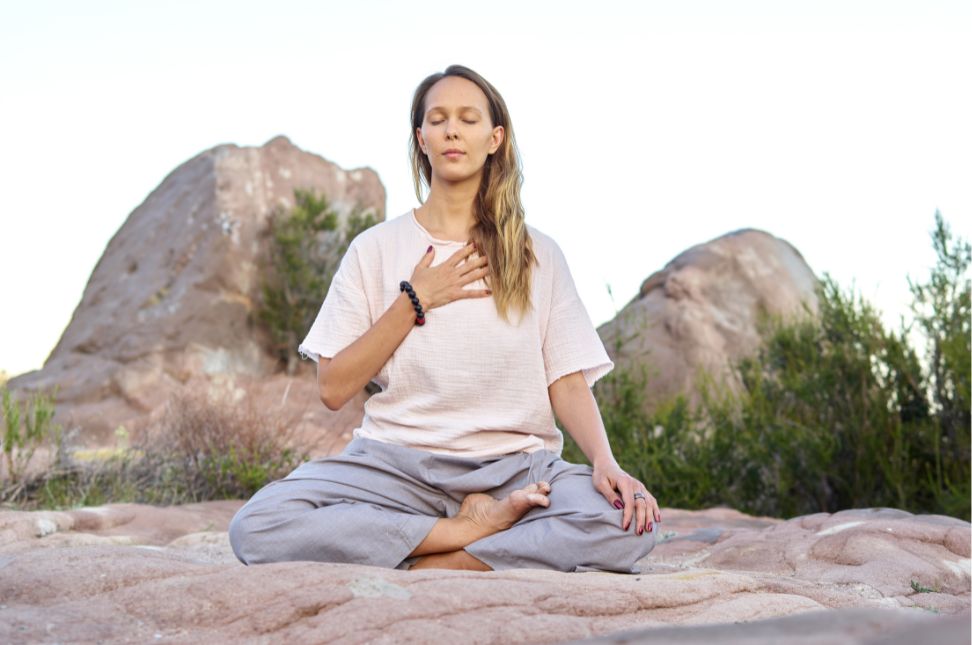In today’s fast-paced world, stress and anxiety have become common issues that affect many people’s lives. One effective way to manage these challenges is through yoga. Yoga for Mental Health offers a holistic approach to reduce stress and anxiety, promoting overall well-being. This article explores various yoga techniques that can help you achieve a calm and balanced mind.
Understanding the Connection: Yoga and Mental Health
Yoga is more than just physical exercise; it is a practice that connects the mind, body, and spirit. The philosophy behind yoga emphasizes mindfulness, breathing, and relaxation, which are crucial for mental health. Regular practice of Yoga for Mental Health can help reduce the production of stress hormones like cortisol and increase the levels of mood-enhancing neurotransmitters such as serotonin.
Key Techniques in Yoga for Mental Health
1. Breathing Exercises (Pranayama)
Pranayama, or controlled breathing, is a cornerstone of yoga practice. It helps regulate the breath, calms the nervous system, and promotes relaxation.
- Nadi Shodhana (Alternate Nostril Breathing): This technique balances the left and right hemispheres of the brain, promoting calmness and reducing anxiety. To practice, sit comfortably, close your right nostril with your thumb, inhale deeply through your left nostril, then close your left nostril and exhale through your right nostril. Repeat on the opposite side.
- Ujjayi Breath (Ocean Breath): This breathing technique involves inhaling and exhaling through the nose while constricting the throat slightly to create a soothing sound. It helps increase oxygen consumption and has a calming effect on the mind.
2. Meditation
Meditation is a powerful tool in Yoga for Mental Health. It trains the mind to focus, reduces the clutter of thoughts, and brings a sense of peace and clarity.
- Mindfulness Meditation: Focus on the present moment, observing your thoughts without judgment. This practice helps in reducing stress and enhancing emotional regulation.
- Loving-Kindness Meditation: This meditation involves sending love and positive energy to yourself and others. It fosters compassion and reduces feelings of anxiety and negativity.
3. Asanas (Postures)

Certain yoga postures are particularly effective in reducing stress and anxiety. These asanas help release physical tension, improve circulation, and calm the mind.
- Child’s Pose (Balasana): A gentle resting pose that calms the mind and relieves tension in the body. Kneel on the floor, sit back on your heels, and stretch your arms forward, resting your forehead on the ground.
- Legs Up the Wall (Viparita Karani): This restorative pose helps relax the body and mind. Lie on your back with your legs extended up against a wall. This posture improves blood circulation and calms the nervous system.
- Cat-Cow Pose (Marjaryasana-Bitilasana): This sequence helps release tension in the spine and promotes deep, rhythmic breathing. Move between arching your back (cow pose) and rounding it (cat pose) while coordinating with your breath.
4. Relaxation Techniques
Incorporating relaxation techniques into your yoga practice can significantly enhance its benefits for mental health.
- Savasana (Corpse Pose): This is the ultimate relaxation pose, typically performed at the end of a yoga session. Lie flat on your back with your arms by your sides and palms facing up. Focus on relaxing each part of your body, releasing all tension.
- Yoga Nidra (Yogic Sleep): A guided meditation that induces deep relaxation and a state of conscious rest. It is particularly effective in reducing anxiety and improving sleep quality.
Integrating Yoga into Daily Life for Mental Health
To fully reap the benefits of Yoga for Mental Health, it is essential to integrate yoga into your daily routine. Here are some practical tips to help you get started:
- Set a Regular Practice Time: Consistency is key to experiencing the mental health benefits of yoga. Choose a specific time each day that works best for you, whether it’s in the morning to start your day calmly or in the evening to unwind.
- Create a Peaceful Environment: Designate a quiet, comfortable space in your home for yoga practice. This space should be free of distractions, allowing you to focus entirely on your practice.
- Start with Short Sessions: If you’re new to yoga, start with shorter sessions and gradually increase the duration as you become more comfortable. Even 10-15 minutes of daily practice can make a significant difference.
- Use Online Resources: There are numerous online platforms offering guided yoga sessions tailored for mental health. These resources can provide structure and guidance, especially for beginners.
- Listen to Your Body: Yoga is a personal journey. Always listen to your body and avoid pushing yourself too hard. Modify poses as needed and focus on what feels right for you.
Real-Life Success Stories

Many individuals have experienced profound transformations in their mental health through the practice of yoga. Here are a few inspiring stories:
- Sarah’s Story: Sarah, a busy executive, struggled with chronic stress and anxiety. She began incorporating a 20-minute yoga session into her morning routine, focusing on pranayama and gentle asanas. Within a few weeks, she noticed a significant reduction in her stress levels and an overall improvement in her mood.
- John’s Journey: John, a college student, battled with anxiety and insomnia. He discovered Yoga for Mental Health and started practicing mindfulness meditation and yoga nidra before bed. This practice helped him achieve restful sleep and manage his anxiety more effectively.
- Emma’s Experience: Emma, a mother of two, found herself overwhelmed with daily responsibilities. She started attending a local yoga class that emphasized relaxation techniques and restorative poses. Yoga became her sanctuary, helping her regain balance and mental clarity.
Conclusion
The practice of Yoga for Mental Health offers a holistic and effective approach to managing stress and anxiety. By incorporating techniques such as pranayama, meditation, asanas, and relaxation, you can cultivate a calmer, more balanced mind. Consistent practice not only improves mental well-being but also enhances overall quality of life.
Whether you are new to yoga or a seasoned practitioner, embracing Yoga for Mental Health can lead to profound and lasting benefits. By making yoga a part of your daily routine, you can navigate the challenges of life with greater ease and resilience. Start your journey today and experience the transformative power of yoga for a healthier, happier mind.




